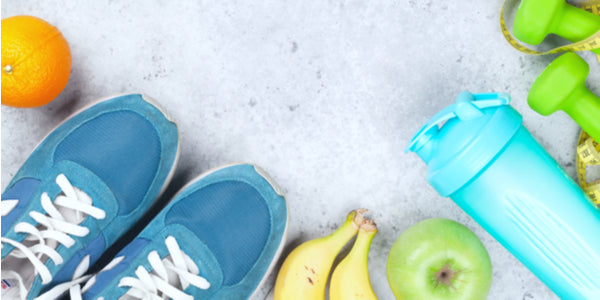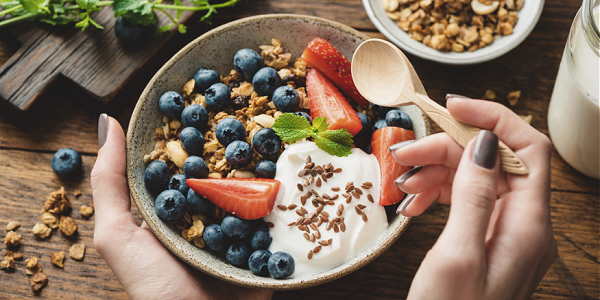
Running is a feat for the strong, both mentally and physically. Running requires exemplary stamina, endurance, and mental strength. Because so, it also requires a solid nutrition plan to ensure top training that leads to peak running performance on race day.
The sport of running requires ample fuel, often, more than most sports, thus runners’ nutritional needs may differ from other athletes or weekend warriors. Still, nutrition for runners is nuanced and will differ based on individual goals and competition lengths.
Consume the following eating tips for runners with subtlety (pun intended), and allow the body to dictate nutritional needs as often as possible because it knows best!
Nutritional Requirements for Marathon Runners
As mentioned, running requires plenty of fuel. The act of running recruits many muscle groups, especially within the legs and glutes, and they need a lot of energy to perform adequately. Macronutrient recommendations differ before and after a race, but carb and protein are the main focus 3 to 4 hours before and 1 to 2 hours after it.
Because running can burn tons of calories, people tend to view it as the best weight loss method. However, keep in mind that while someone burns a lot of fuel while running, this sport does not directly build muscle. Running does not contribute to high post-exercise oxygen consumption, which generates the ultimate fat-burning power that helps people lose weight.
Calories
Calorie requirements are based on prediction equations that consider height, weight, age, and gender plus an appropriate activity factor. In general, tall, muscular males will require the most nutrition of all, and petite females the least.
Many online calculators can generate requirements, but working with a professional like a registered dietitian will ensure the most adequacy. Furthermore, calorie requirements will ebb and flow based on micro, meso, and macro training cycles.
Some of the most elite runners require 6,000 to 10,000 calories a day. On the other hand, the average weekend warrior may not need to alter their caloric intake much at all.
Carbohydrate
Carb guidelines are more straightforward, as many sports professionals agree athletes need about 7 to 10 grams of carbohydrate per kilogram (g/kg) of body weight per day. This is sufficient enough to allow athletes to thrive throughout the training.
During races, consume about 30 to 60 grams of carbohydrate per estimated hour of running. However, intensity also plays a role. Someone intending to finish a marathon in 4 to 5 hours will be fine leaning towards the lower end of 30 grams. However, one hoping to finish in the 2 to 3-hour range should consume on the higher end.
Here are a few examples of common pre and post-run carbohydrate sources:
• 1 banana: 24-30 g
• Sports gel: 21-27 g
• Energy bar: 20-40 g
• 4-5 sports chews: 16-25 g
• 10 jelly beans: 11 g
Protein
Because protein directly helps the muscles grow and repair, it is crucial to prioritize consuming enough daily. The general protein recommendation resides at 0.6 g/kg weight per day. However, endurance athletes are often encouraged to consume 1.0 to 1.4 g/kg body weight per day to ensure a proper repair.
No specific pre-race protein recommendation exists because protein cannot be used for energy. However, it is difficult to eat a meal solely of carbs, and protein is more readily digested compared to fat.
Thus, the athletic community often suggests eating a meal that boasts a ratio of 4:1 carbohydrate to protein, respectively. Some example of this ratio include:
• 1 egg or 2 egg whites + toast
• Oatmeal + soy milk
• 1 sweet potato + 3 ounces (oz) chicken or 1 hard-boiled egg
• 1 packet tuna + rice cakes
• 1 cup quinoa
Post-race, focus on consuming about 20 to 30 grams of protein within 30 minutes of finishing. Also, consume at least 20 grams of protein in every subsequent meal throughout the day as well.
High-intensity and long endurance exercise can cause gastric upset and decrease appetite shortly after completion. Some find it easier to consume their carbohydrate and protein in liquid form for the first couple of snacks/meals post-race.
Fat
While healthy fats contribute much towards heart and brain health, they offer little towards athletic endeavors. If too much is consumed beforehand, fat can wreak havoc on the digestive system during a race and leave you feeling full and lethargic.
Most sports nutrition professionals advise eating as little fat as possible the day of or before a race. Notably, many people can tolerate a tablespoon or so of peanut butter, butter, or cream cheese on a bagel or bread. However, eggs, cheese, meat, and other high-fat food sources tend not to fare well with most athletes.
While not as important to minimize fat within the post-run meal, it is still the least important macronutrient of focus. Meaning, no need to intentionally avoid a food or meal that contains fat, but prioritize carb and protein and fill in the rest of the meal with fat.
Basic Nutrition Advice for Runners
Advice regarding basic nutrition for runners include hydration guidelines and meal timings. These include what (or if) to eat before, during, and after a run or race.
Overall Hydration
Before diving into the food component, it is vital for runners and every other athlete to stay properly hydrated. However, needs vary for every person based on body composition, genetics, sweat rate, and race/run conditions.
The gold standard of gauging hydration involves weighing before and after a run and adding the amount of fluids consumed during the run. However, this is quite inconvenient, so monitoring urine color is another easy way to gauge hydration. Urine color should be pale yellow to nearly clear.
While very uncommon, drinking too much water can lead to hyponatremia. This is a condition where the overconsumption of water causes electrolyte imbalance, which can lead to seizures and even death.
Drink plenty of water on the days leading up to the race and aim for an average of 30 to 60 oz day of the competition. Too much more and the restroom or portalet will probably be more than necessary!
Pre-Workout Meals/Snacks & Hydration
The pre-race meal influences performance without a doubt. Scientific and anecdotal evidence suggests eating 100 grams of carb 3 to 4 hours before the race is best practice.
However, for exceptionally early races, it might not be possible to eat this far in advance. In this instance, it is best to listen to rely on experience. Some people may tolerate a bagel, banana, and coffee 1 to 2 hours before the race. Others, however, may only be able to consume a granola bar 1 to 2 hours before.
This is ultimately why it is vital to practice what you will be doing on race day as preparation during training. For example, if the earliest time to eat on race day is 2 hours beforehand, consume exactly what will be consumed on race day.
A few groups should be avoided before long endurance running such as foods high in fat, fiber, and salt. Fat takes the longest to digest and if the body is forced to continue digesting while also trying to push in a run, it may experience gastrointestinal problems. This can also occur with fiber, as it takes the body a while to break down this kind of carbohydrate.
The pre-race meal is one of the only instances when a dietitian might encourage white grains over whole wheat! Finally, while electrolytes are very important, most Americans consume enough, even too much sodium on a regular basis. Too much salt can dehydrate the body, so savor salt in the form of an electrolyte drink or after the race.
Some of the most common and results-driven pre-competition meals include:
• Bagel + minimal butter or cream cheese or PB, banana, and coffee
• Two waffles + syrup + berries
• Bowl of oatmeal + syrup and banana
• Granola bar + banana
• Toast + honey and banana
• Plain bowl of white rice or other low-fiber grain
During a Race Lasting Longer Than an Hour
Generally speaking, consuming nutrition during a race is unnecessary for anything shorter than an hour or so. However, some well-trained athletes forgo any nutrition during any run shorter than a half marathon. This is okay as long as this was practiced before the major race/run day.
For most, though, it is prudent to consume some carbohydrates and fluid during the race. As mentioned in the carbohydrate section above, aim to consume about 30 to 60 grams of carbohydrate per estimated hour of running.
Fluid requirements are more individualized, though a good rule of thumb is to take the offered cup of water or sports drink at every or every station. Aim to successfully drink 3 out of the 5 oz these cups contain.
Post Workout Meals/Snacks & Hydration
Sometimes undervalued, the post-workout or race meal is vital for recovery purposes. This especially serves true if another race is in the near future.
Just like the pre-race meal, focus on carbohydrate and protein, specifically in a ratio of 2 to 1. An ideal food or meal for post-race includes about 40 to 60 grams of carbs and at least 20 grams of protein. The carbs help replenish glycogen stored in the muscles and liver, while protein will helps the muscles repair and rebuild.
It is very common to indulge in epic post-race meals and drinks. While this is definitely OK, remember that many people's digestive systems are fragile, and very high fat, salty, highly refined meals will contribute minimally to recovery. Alcohol is no exception.
Alcoholic drinks frequently signify the celebratory finish of a race, they only further dehydrate the body. This can lead to the feeling of having a hangover, sometimes called being "rungover" amongst the running community.
The absolute best post-run meal will include:
• Wholesome complex carbohydrates that are moderate to high in fiber such as oats, brown rice, and potatoes.
• Lean protein like chicken breast, fish, eggs, protein shakes, and tofu.
• Low to moderate healthy fats like avocado, olive oil, and nuts/seeds.
Diet Tips for Runners
Diet tips for runners to consider include whether or not to load up on carbs and take supplements. Tuning into the overall nutrient-density of the daily diet and fueling practice are likewise important.
Carb Loading
Although traditionally accepted and a social activity unique to the running community, much controversy surrounds carb loading before races. Some sport performance professionals are not big fans because it could be rendered unnecessary with constant proper nutrition. If partaking in carb loading, aim to eat very low carb about 7 days prior to the race until about 3 days before.
Three days before, aim to eat a diet consisting of 60% carbohydrate, and 15-20% protein, with the remaining part as fat. Essentially, the point is to drain the glycogen from the body and then amply resupply it with glucose. This will be stored as glycogen for the muscles and eventually the liver during the race.
Mediterranean Diet
Because of the load and demand for running, diet is central to performing well. While many factors dictate which diet works best, the Mediterranean diet is widely accepted as one of the most robust and nutrient-dense dietary patterns.
The Mediterranean diet focuses on whole foods rich in vitamins, minerals, antioxidants, polyphenols, antiinflammatory constituents, and other nutrients. The diet places on emphasis on:
• Plenty of fruits and vegetables
• Lean proteins like chicken and turkey,
• Seafood
• Beans and legumes
• Whole grains
• Healthy fats
• A popular favorite- red wine! (Just be sure not to indulge three days leading up to a race.)
Runners can greatly benefit from this dietary pattern because of its nutrient density and extremely high antioxidant content. Antioxidants help scavenge free radicals and inflammation associated with the act of running.
Practice Fueling During Training
Simply put, do not chance or do anything for the first time on race day. Digestive systems have a mind of their own (quite literally called the enteric nervous system), and tend to rebel even more so during intense running.
Therefore, practice the intended nutrition regimen for race day well before race day, and preferably during long runs, as these most closely mimic the race. Focus on mimicking the pre-race meal as well as the nutrition during the run.
Replicating the post-race meal is not as important. But if another race is in the near future, consider monitoring how certain foods or meals affect recovery.
Supplementation
A nutritionally robust diet may not warrant additional supplementation, however, because running is so physically demanding, some folks may need it. Specific supplements will be highly individualistic but the following list includes some of the most common:
• Caffeine
• Beetroot/nitrate
• Beta-alanine
• Iron
• B12
• Vitamin D
• Vitamin E
• Vitamin C
• Turmeric/curcumin
• Whey or plant-based protein powder
Overall, it is best to work with a professional to determine which ones may be necessary.
Nutrition Tips for Runners Summarized
The main takeaways to ensuring sound nutrition for runners include the following:
• Consume enough energy (calories) throughout the day.
• Focus on eating carbohydrates and low to moderate protein before a run or competition and after.
• Consume healthy fats outside of your before and after run window (2~4 hours) if possible.
• Eat plenty of fruits and veggies that are high in antioxidants to help scavenge free radicals.
• Get enough protein every day to ensure proper rehabilitation of muscles.
• Hydrate, hydrate, hydrate all throughout the day every day and avoid dehydrating drinks like too much caffeine.
• Supplement if needed in addition to eating a healthy diet and consult with a professional about which ones might be helpful.
• Remember that carb loading is really only necessary for bouts of running longer than 60 minutes. Research shows it can be helpful to empty the tank beginning about 7 days before the race/competition and then start carb loading 2 to 3 days prior to the event day.
Overall, nutrient needs vary amongst runners dependent on many factors such as gender, fitness level, weekly mileage, etc. Consulting with a dietitian can help determine nutrient needs specific for you and your goals.
References:
Marathon Fueling - Runners Need Proper Nutrition and Hydration for the 26.2-Mile Stretch. http://www.todaysdietitian.com/newarchives/030810p36.shtml.
The five supplements that can have performance benefits for runners. Canadian Running Magazine. https://runningmagazine.ca/health-nutrition/the-five-supplements-that-can-have-performance-benefits-for-runners/.
A Complete Guide to Proper Marathon Nutrition. Be Prepared For Race Day. https://www.trainingpeaks.com/blog/a-complete-guide-to-proper-marathon-nutrition/.







